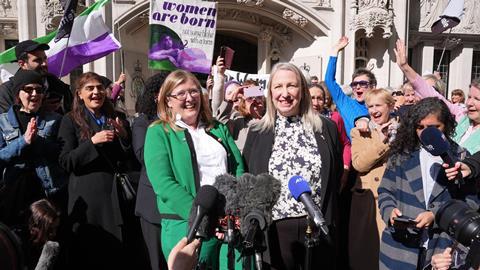The Supreme Court today unanimously ruled that ‘woman’ in the Equality Act 2010 refers to a biological woman. Before handing down a summary of the court’s judgment in For Women Scotland Ltd v The Scottish Ministers, president of the Supreme Court Lord Reed warned ‘some people here will be pleased, and others will be disappointed’. He added: ‘Whatever your feelings will be please respect the dignity of these proceedings until court has adjourned.’
The 88-page judgment, described as ‘long’ by Lord Hodge, allowed the appeal brought by Scottish campaign group For Women Scotland challenging the lawfulness of statutory guidance issued by the Scotland government, stating that a gender recognition certificate (GRC) brought indviduals within the EA definition of ‘woman’.
Lord Hodge, Lady Rose and Lady Simler, with whom Lord Reed and Lord Lloyd-Jones agreed, said the language of the EA in its ‘context and purpose, demonstrate that the words “sex”, “woman” and “man”…mean (and were always intended to mean) biological sex, biological woman and biological man’.
Those words ‘cannot properly be interpreted as also extending to include certificated sex without rendering them incoherent and unworkable’, Lord Hodge said.
The Supreme Court’s conclusion ‘does not remove or diminish the important protections available under the EA 2010 for trans people with a GRC’, the judgment said, finding ‘to the contrary, this potentially vulnerable group remains protected in the ways we have described’. It added: ‘The interpretation of the EA 2010 (ie the biological sex reading), which we conclude is the only correct one, does not cause disadvantage to trans people, with or without a GRC.
‘In the light of case law interpreting the relevant provisions, they would be able to invoke the provisions on direct discrimination and harassment, and indirect discrimination. A certificated sex reading is not required to give them those protections.’
Rosie Walker, head of litigation & dispute resolution at Edinburgh-headquartered firm Gilson Gray, instructed by intervenors Sex Matters in the claim, said: ‘We are very proud to have been instructed in this landmark case, in which we represented Sex Matters with counsel, Ben Cooper KC and David Welsh.’
She said: ‘The ruling provides much-needed clarity over the definition of sex for the purposes of the Equality Act 2010, and the court recognised the valuable contribution made by Sex Matters to this important question of equality law.’
Pictured above: Susan Smith (centre left) and Marion Calder (centre right), co-directors of For Women Scotland, outside the Supreme Court today
This article is now closed for comment.































31 Readers' comments